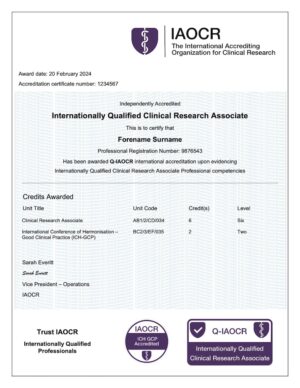The International Accrediting Organization for Clinical Research (IAOCR) contributes to the career development and professional recognition of clinical research professionals. Established with the mission to elevate the standards of clinical research globally, the IAOCR delivers the most robust framework for accrediting individuals and certifying organizations, to globally recognized standards. This helps to ensure that clinical research staff have demonstrated the competency required to deliver high-quality clinical research consistently.
In this blog, we offer an overview of the responsibilities involved in the role of a clinical research professional as they progress in their clinical research career as well as our advice on how to achieve and excel at each level.
Entry-Level Positions
The typical entry point for a career in clinical research is through roles such as Clinical Trial Assistant (CTA) or Clinical Research Coordinator (CRC). These positions offer hands-on experience in the daily operations of clinical trials, including patient recruitment, data entry, and compliance with regulatory standards. CTAs typically are based in an office environment and aren’t expected to visit clinical trial sites on a frequent basis.
Key responsibilities are centred around the handling of administrative tasks related to clinical trials. These include assistance in the preparation and maintenance of trial documentation and coordination with clinical sites to ensure they have the necessary supplies to commence a clinical trial.
CTAs and CRCs should focus on developing strong organizational and communication skills as well as building a solid understanding of Good Clinical Practice (GCP) guidelines and the relevant regulatory requirements.
Mid-Level Positions
As you gain experience, you can progress into mid-level roles such as Clinical Research Associate (CRA) or Clinical Data Manager roles. CRAs conduct site visits and monitor trial progress, which helps to ensure data integrity and compliance with regulatory standards. The CRA role is more hands-on and involves direct interaction with clinical trial sites. They play a key role in ensuring the quality and integrity of the data collected during the trial.
CRAs become deeply involved in the operational and compliance aspects of clinical trials and these positions involve more responsibility, such as ensuring data accuracy and managing more complex aspects of trial conduct.
To excel at this level, it is necessary to develop your understanding of clinical trial protocols and data management systems. You need to develop strong analytical and problem-solving skills, as well as having excellent communication skills
Senior-Level Positions
With further experience and specific training for the different skills required at senior levels, you can progress to senior roles such as Senior or Lead CRA, Clinical Trial Manager, Clinical Project Manager, or Regulatory Affairs Specialist. These positions involve working across multiple trials, managing teams, and ensuring strategic alignment with organizational goals.
At this point in a clinical research career, senior positions are involved in clinical research at all points in the drug development pathway and provide expert input and decision-making for clinical development plans.
Depending on the organization, ethical oversight of a project may become a more common responsibility. This would include protecting participants’ rights and obtaining and documenting informed consent.
Clinical research professionals need to develop leadership and project management skills and gain experience in budgeting, resource allocation, and regulatory submissions.
Executive-Level Positions
For CRAs who have gained significant experience and a proven track record, executive-level roles beckon. At this level, there is the opportunity to shape the strategic direction of clinical research within an organization.
Roles such as Director of Clinical Operations or Vice President of Clinical Development, come with great responsibility as they can oversee an entire clinical research portfolio, set strategic goals and ensure alignment with organizational objectives. Directors can lead cross-functional teams and manage large-scale budgets.
There will be a high requirement for strategic thinking and high-level decision-making, the ability to build strong leadership and interpersonal skills and to network with industry leaders. At the organizational level, a clinical research professional might for the first time find themselves managing stakeholders including sponsors, investigators and regulatory bodies. Financial management of budgets and financial planning for projects also add to the role.
As always, the IAOCR recommends that clinical research professionals at all levels seek opportunities for further training and accreditation to aid them on their clinical research career path.










